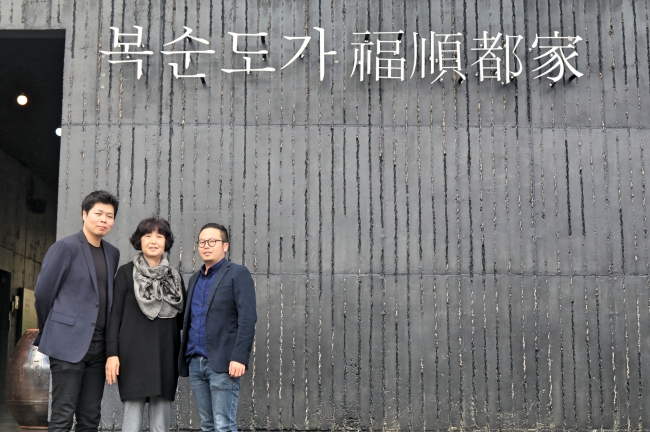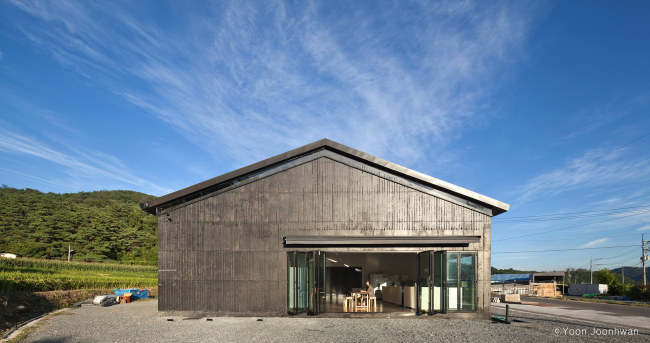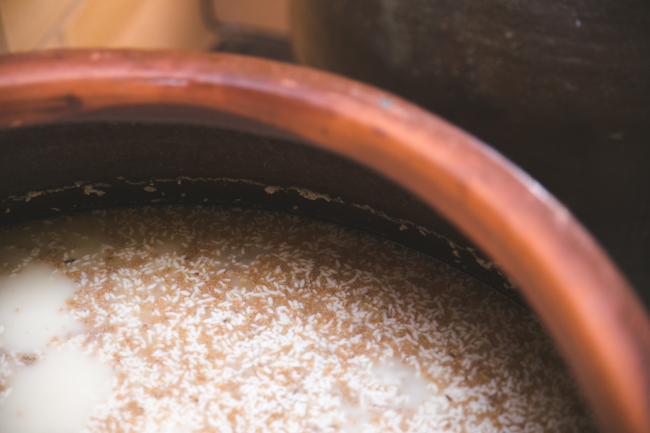[Weekender] From Grandma’s home to store shelves, Boksoondoga makgeolli goes global
Architect Kim Min-kyu returns home, applies ‘fermentation architecture’ thesis to expand family business
By Korea HeraldPublished : Nov. 11, 2016 - 17:00
ULSAN -- A recipe for homemade rice wine that started out as one humble grandmother’s hobby is now well on its way to becoming one of the country’s top brands.
Architect Kim Min-kyu and mathematician Kim Min-kook took their grandmother’s recipe for Korean rice wine -- known as makgeolli -- and established Boksoondoga brewery last year just outside Ulsan.
Min-kook focused on the science of said makgeolli, systemizing a larger-scale fermentation process, while his older brother Min-kyu focused on the more artistic side of the business.
After graduating from the Irwin S. Chanin School of Architecture of the Cooper Union in New York City, Min-kyu returned to Korea to help turn his family’s makgeolli recipe into a marketable product.
“My grandmother used to make makgeolli at home and she kept these giant traditional Korean clay pots in a room in her house where she would ferment all the rice wine,” said Min-kyu, during an interview with The Korea Herald at the Boksoondoga brewery in Ulsan in October.
“When my family made this makgeolli at home, they didn’t make it as a product or a business, but just made it for our family and to share it with other people in their villages,” he continued.
“The recipe for the makgeolli was then passed down to my mother, who made it at our home. Then one day, about seven years ago, my brother and I toyed with the idea of what if we could make an actual product out of this.”
Architect Kim Min-kyu and mathematician Kim Min-kook took their grandmother’s recipe for Korean rice wine -- known as makgeolli -- and established Boksoondoga brewery last year just outside Ulsan.
Min-kook focused on the science of said makgeolli, systemizing a larger-scale fermentation process, while his older brother Min-kyu focused on the more artistic side of the business.
After graduating from the Irwin S. Chanin School of Architecture of the Cooper Union in New York City, Min-kyu returned to Korea to help turn his family’s makgeolli recipe into a marketable product.
“My grandmother used to make makgeolli at home and she kept these giant traditional Korean clay pots in a room in her house where she would ferment all the rice wine,” said Min-kyu, during an interview with The Korea Herald at the Boksoondoga brewery in Ulsan in October.
“When my family made this makgeolli at home, they didn’t make it as a product or a business, but just made it for our family and to share it with other people in their villages,” he continued.
“The recipe for the makgeolli was then passed down to my mother, who made it at our home. Then one day, about seven years ago, my brother and I toyed with the idea of what if we could make an actual product out of this.”

As for the actual winery, Min-kyu based the entire process of designing and construction of the brewery based on his college thesis on what he dubbed “Fermentation Architecture.”
While the traditional definition of fermentation refers to the change in characteristics of organic matter, the architect reinterpreted it as the process of defining the change of space for the benefit of people. One of the key distinguishing factors of Boksoondoga’s wine is not only its emphasis on using strictly local ingredients, but its inclusion of the local community.
“The meaning of fermentation is not just the fermenting of food or alcohol, I think we are also able to ferment our hearts, so to speak,” said Minkyu. “So I thought about how I would be able to apply this fermentation idea to space and landscape, and even to the community.”
“People are not eating as much rice as they did a long time ago. It became a real social problem in Korea because farmers were harvesting more rice than people were eating. So the Korean government tried to reduce the number of rice fields in Korea. Now you can see (in Ulsan) that there are a lot of industrial zones here where there used to be rice fields,” he continued.
“While I don’t think it’s bad having this type of industrial zone, I think it is a problem for the people who have been living here for a long time -- they’ve been working as farmers for forever. But now, they’re losing their land, their jobs and their livelihoods. The reason we chose this location is to try and help revive the area. We work with local people here, using all local rice for our wine,” Kim says.

“One of our biggest focuses is not just about us being a business, but about us giving back to our community and keeping everything as local as possible. Even when we built this building (the Boksoondoga winery), we didn’t use professional construction workers. This was all built by local residents.”
Using traditional Korean yeast, called nuruk, Boksoondoga makgeolli is still made by hand and fermented using Korean traditional clay pots. The family shuns metal industrial tanks for fear of affecting the homemade flavor of the wine.
Natural carbonation produced in the process of fermenting traditional Korean yeast provides Boksoondoga with a usually refreshing effervescence, similar to Champagne. And unlike other local rice wines, Boksoondoga’s natural CO2 content allows for the wine to instantly mix itself upon opening, without having to shake the bottle.
Slowly fermenting at a low temperature without adding any preservatives churns out a healthier and more nutrient-filled rice wine that also reduces the severity of next day hangovers.

The rice wine’s unique mild taste and natural fizz have helped it snap up both local and international accolades left and right in recent years.
The homemade rice wine was selected as the official alcoholic beverage for the Nuclear Security Summit in 2012, the 2013 Blue House Presidential Banquet dinner with overseas diplomatic officials and the opening of the Expo Milano 2014 Korean exhibition titled “Hansik as the Proposal for the Future: Food for Life.”
The Boksoondoga makgeolli has also won the Gold Medal Award at the San Francisco International Wine Competition, silver at the International Wine & Spirit Competition and bronze at the Los Angeles International Wine Competition.
Earlier this year, the family’s rice wine was also awarded the “K-Ribbon,” an award given by the Ministry of Culture, Sports and Tourism as part of its cultural brand push. The ribbon is awarded to products the ministry deems possessing “Korea’s unique cultural value.”
Because all of the rice wine is still hand-brewed to maintain the highest quality possible, the wine is only available in limited quantities compared to mainstream factory-produced makgeolli.
However, its limited production has not stopped the family from expanding their name, as the small-town refinery has started exporting Boksoondoga to Japan, with their sights set on China.
By Julie Jackson (juliejackson@heraldcorp.com)
-
Articles by Korea Herald


















![[KH Explains] Hyundai's full hybrid edge to pay off amid slow transition to pure EVs](http://res.heraldm.com/phpwas/restmb_idxmake.php?idx=652&simg=/content/image/2024/04/18/20240418050645_0.jpg&u=20240418181020)

![[Today’s K-pop] Zico drops snippet of collaboration with Jennie](http://res.heraldm.com/phpwas/restmb_idxmake.php?idx=642&simg=/content/image/2024/04/18/20240418050702_0.jpg&u=)